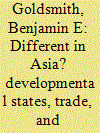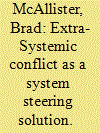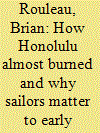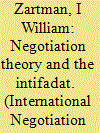|
|
|
Sort Order |
|
|
|
Items / Page
|
|
|
|
|
|
|
| Srl | Item |
| 1 |
ID:
119484


|
|
|
|
|
| Publication |
2013.
|
| Summary/Abstract |
In this article, I ask what might be the effect of international trade on interstate conflict in Asia and the Pacific. Overall, the associations of trade interdependence and trade volume in the region appear similar to those globally: interdependence is accompanied by a reduction in the chance of militarized conflict onset, whereas the volume of trade appears to reduce the chance of conflict escalation to deadly international violence. I suggest a partial exception for East Asia, implying weaker associations between trade and pacific outcomes. I argue that the regionally common 'developmental state' model allows such states to more freely, but less credibly, use trade as a foreign policy tool, reducing trade's constraint upon East Asian states in security affairs. Analyses of East Asian dyads and of developmental states in data from all regions of the globe support my contention that trade interdependence has weaker pacific effects in these contexts, although some other expectations are not supported.
|
|
|
|
|
|
|
|
|
|
|
|
|
|
|
|
| 2 |
ID:
067794


|
|
|
| 3 |
ID:
132026


|
|
|
|
|
| Publication |
2014.
|
| Summary/Abstract |
This article argues that in ignoring the exploits of American sailors overseas, diplomatic historians have missed a very important facet of the early republic's foreign relations. It claims that 1898 did not represent any decisive turn to the international, but rather, a moment in which primary control over the nation's foreign relations shifted from maritime nonstate actors to the state itself. To make this case, the essay discusses the form and substance of violent altercations between American seafarers and those they encountered abroad. It reads barroom brawling and harborside tumult as "diplomatic fisticuffs," that is, as sites for the enactment of a distinct, working-class and masculine foreign relations agenda. Politicians, diplomats, and missionaries, however, saw the mighty influence seafaring men exerted overseas as deeply problematic. But even as the American state worked to control rambunctious sailors, late nineteenth-century policy makers discovered that appropriating the violent words and deeds of the nation's nautical class could prove useful in justifying imperial adventure abroad. Thus even as the nation's mariners receded from view overseas, they continued to influence events around the globe.
|
|
|
|
|
|
|
|
|
|
|
|
|
|
|
|
| 4 |
ID:
137646


|
|
|
|
|
| Summary/Abstract |
The evolution of the Arab Spring in eight countries is primarily a matter of negotiation. The instances can be broken down into Short Track (Tunisia, Egypt) and Long Track (Syria, Libya, Yemen) Transitions and Short Track (Algeria, Morocco, Bahrain) Reactions. They bring a number of lessons for negotiation analysis, primarily on scope and power, and their deviation from an ideal type model can be explained by the predominance of distributive over integrative negotiation and the imposition of a three-dimensional scene for negotiation and legitimization, with an Islamic dimension overlaying the usual left-right spectrum.
|
|
|
|
|
|
|
|
|
|
|
|
|
|
|
|
| 5 |
ID:
139792


|
|
|
|
|
| Summary/Abstract |
A consensus exists that countries that have recently undergone domestic political revolutions are particularly likely to become involved in military conflicts with other states. However, scholars seek to understand when and why revolutions increase the likelihood of international violence. In contrast to existing work focusing on international systemic factors, we argue that revolution fosters conflict in part by affecting states’ domestic political structures. Previous research has shown that revolution tends to bring particularly aggressive leaders to power. We demonstrate that revolutions also frequently result in personalist dictatorships, or regimes that lack powerful institutions to constrain and punish leaders. By empowering and ensconcing leaders with revisionist preferences and high risk tolerance, revolutions that result in personalist dictatorships are significantly more likely to lead to international conflict than revolutions that culminate in other forms of government. Our arguments and evidence help explain not only why revolution so commonly leads to conflict, but also why some revolutions lead to conflict whereas others do not.
|
|
|
|
|
|
|
|
|
|
|
|
|
|
|
|
|
|
|
|
|